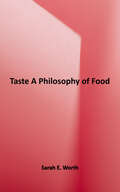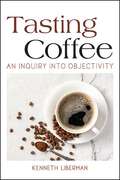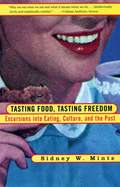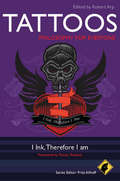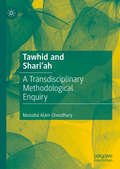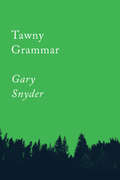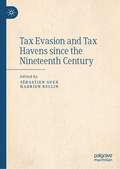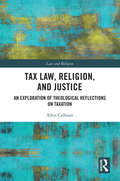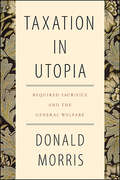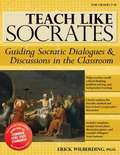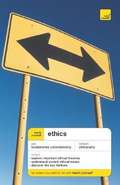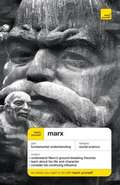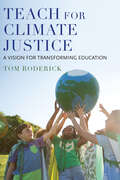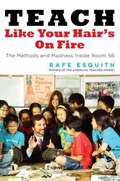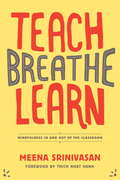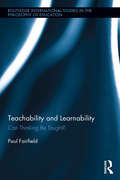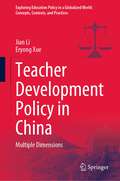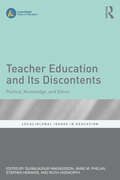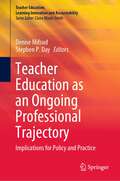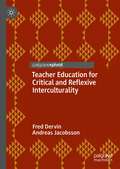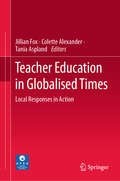- Table View
- List View
Taste: A Philosophy of Food
by Sarah E. WorthWhen we eat, we eat the world: taking something from outside and making it part of us. But what does it taste like? And can we develop our taste? In Taste, Sarah Worth argues that taste is a sense that needs educating, for the real pleasures of eating only come with an understanding of what one really likes. From taste as an abstract concept to real examples of food, she explores how we can learn about and develop our sense of taste through themes ranging from pleasure, authenticity, and food fraud, to visual images, recipes, and food writing.
Tasting Coffee: An Inquiry into Objectivity
by Kenneth LibermanAt once ethnographic and phenomenological, Tasting Coffee investigates the global chain of coffee production "from seed to cup," stopping at every stage along the way to describe the tasting practices of each stakeholder purveying coffee. The ethnomethodological care of these descriptions derives from an attunement to just how these stakeholders discover and describe the flavors of coffee and how they convert subjective experience into objective knowledge. The methods and protocols of sensory science are also examined and assessed in their lived details, making this study also a contribution to the sociology of science. Based upon a decade of research in fourteen countries, author Kenneth Liberman provides a nonessentialist ontology of coffee, its history, and its production. The world of coffee becomes a microcosm in which many realities of postmodern humanity are exposed and clarified—with the thoughts of Edmund Husserl, Alfred Schutz, Martin Heidegger, Hans-Georg Gadamer, Emmanuel Levinas, Maurice Merleau-Ponty, Jacques Derrida, Ludwig Wittgenstein, Aron Gurwitsch, and Harold Garfinkel—even as these naturally occurring case studies provide fresh specifications for these thinkers' ideas.
Tasting Food, Tasting Freedom: Excursions Into Eating, Power, and the Past
by Sidney W. MintzA renowned anthropologist explores the history and meaning of eating in America. Addressing issues ranging from the global phenomenon of Coca-Cola to the diets of American slaves, Sidney Mintz shows how our choices about food are shaped by a vast and increasingly complex global economy. He demonstrates that our food choices have enormous and often surprising significance.
Tattoos - Philosophy for Everyone
by Robert ArpCovering philosophical issues ranging from tattooed religious symbols to a feminist aesthetics of tattoo, Tattoos and Philosophy offers an enthusiastic analysis of inking that will lead readers to consider the nature of the tattooing arts in a new and profound way.Contains chapters written by philosophers (most all with tattoos themselves), tattoo artists, and tattoo enthusiasts that touch upon many areas in Western and Eastern philosophyEnlightens people to the nature of tattoos and the tattooing arts, leading readers to think deeply about tattoos in new ways Offers thoughtful and humorous insights that make philosophical ideas accessible to the non-philosopher
Tawhid and Shari'ah: A Transdisciplinary Methodological Enquiry
by Masudul Alam ChoudhuryThis book invokes the Tawhidi ontological foundation of the Qur’anic law and worldview, and is also a study of ta’wil, the esoteric meaning of Qur’anic verses. It presents a comparative analysis between the Tawhidi methodology and the contemporary subject of Shari’ah. Masudul Alam Choudhury brings about a serious criticism of the traditional understanding of Shari’ah as Islamic law contrary to the holistic socio-scientific worldview of the unity of knowledge arising from Tawhid as the law. A bold repudiation of the Islamic traditional understanding and the school of theocracy, Choudhury’s critique is in full consonance with the Qur’an and Sunnah. It is critical of the sectarian (madhab) conception of relational independence of facts. Thus the non-creative outlook of Shari’ah contrasts with universality and uniqueness of Tawhid as the analytically established law explaining the monotheistic organic unity of being and becoming in ‘everything’. This wide and strict methodological development of the Tawhidi worldview is articulated in this work. The only way that Tawhid and Shari'ah can converge as law is in terms of developing the Tawhidi methodology, purpose and objective of the universal and unique law in consonance with the ontology of Tawhid. Such a convergence in the primal ontological sense of Tawhid is termed as maqasid as-shari'ah al-Tawhid.
Tawny Grammar: Essays (Counterpoints #2)
by Gary SnyderTwo beautifully paired essays, “Tawny Grammar” and “Good, Wild, Sacred," serve to offer an autobiographical framework for Gary Snyder's long work as a poet, environmentalist, and a leader of the Buddhist community in North America.He begins standing outside a community hall in Portland, Oregon, in 1943 and concludes as a homesteader in the backcountry of Northern California more than forty–five years later. A wonderful introduction to Gary Snyder, this will also serve to remind his faithful readers of the thrill of his insights and his commitments crucial to our future on Turtle Island.Each palm–size book in the Counterpoints series is meant to stay with you, whether safely in your pocket or long after you turn the last page. From short stories to essays to poems, these little books celebrate our most–beloved writers, whose work encapsulates the spirit of Counterpoint Press: cutting–edge, wide–ranging, and independent.
Tax Evasion and Tax Havens since the Nineteenth Century
by Sébastien Guex Hadrien BuclinThis collective book offers a panorama of the history of tax evasion, tax avoidance and tax havens from the nineteenth century to the present day, based on the latest research in contemporary history. It aims to show that this phenomenon is at the heart of global capitalism, partly as a response of the ruling classes to the rise of progressive taxation, but for other reasons too: notably the development of a powerful tax evasion and avoidance industry in different countries. The book argues that tax competition between states has stimulated the development of tax havens. It discusses the notion of the ‘tax haven’ and proposes a more rigorous concept - that of the ‘tax predator’. Finally, the book sheds light on the socio-political conflicts that have developed around tax evasion and the way in which states have fought against or tolerated the phenomenon.
Tax Fairness and Folk Justice
by Steven M. SheffrinWhy have Americans severely limited the estate and gift tax - ostensibly targeted at only the very wealthy - but greatly expanded the subsidies to low-wage workers through the Earned Income Tax Credit, now the single largest poverty program in the country? Why do people hate the property tax so much, yet seemingly revolt against it only during periods of economic change? Why are some groups of taxpayers more obedient to the tax authorities than others, even when they face the same enforcement regime? These puzzling questions all revolve around perceptions of tax fairness. Is the public simply inconsistent? A sympathetic and unified explanation for these attitudes is based on understanding the everyday psychology of fairness and how it comes to be applied in taxation. This book demonstrates how a serious consideration of "folk justice" can deepen our understanding of how tax systems actually function and how they can perhaps be reformed.
Tax Law, Religion, and Justice: An Exploration of Theological Reflections on Taxation (Law and Religion)
by Allen CalhounThis book asks why tax policy is both attracted to and repelled by the idea of justice. Accepting the invitation of economist Henry Simons to acknowledge that tax justice is a theological concept, the work explores theological doctrines of taxation to answer the presenting question. The overall message of the book is that taxation is an instrument of justice, but only when taxes take into account multiple goods in society: the requirements of the government, the property rights of society’s members, and the material needs of the poor. It is argued that this answer to the presenting question is a theological and ethical answer in that it derives from the insistence of Christian thinkers that tax policy take into account material human need (necessitas). Without the necessitas component of the tax balance, tax systems end up honoring only one of the three components of the tax equation and cease to reflect a coherent idea of justice. The book will be of interest to academics and researchers working in the areas of tax law, economics, theology, and history.
Taxation in Utopia: Required Sacrifice and the General Welfare
by Donald MorrisTaxation in Utopia explores utopian political philosophy from the neglected perspective of taxation. At its core, taxation is an ethical question. It requires people to sacrifice for the benefit of others, whether or not they also benefit themselves. Donald Morris refers to this broader, nonmonetary context as constructive taxation, which includes restrictions on privacy and access to information, constraints on marriage and child-rearing, and conventions restricting the proprietorship of land. Morris examines this in the context of various utopian writings, such as More's Utopia, as well as literary treatments of these issues, such as Bellamy's Looking Backward. This interdisciplinary exploration of utopian taxation provides a novel approach to examining relations between a state's view of the general welfare and the sacrifices this view requires of its citizens.
Teach Like Socrates: Guiding Socratic Dialogues And Discussions In The Classroom
by Erick WilberdingWhat is the Socratic method? How can we bring the Socratic method into the middle school and high school classroom? How does one lead a Socratic discussion? How does one develop the discussion skills of students? Using passages from the works of Plato and Xenophon, Teach Like Socrates answers each of these questions, clearly explaining the most famous and the most misunderstood teaching method in the world. Unrivaled as a constructive method for guidance in critical thinking and problem solving, the Socratic method can be brought into the classroom every day for the inductive exploration of ideas and scaffolded problem solving as well as for cooperative discussion. The book includes templates, sample lesson plans, discussion games, and example dialogues from students. Socratic teaching leads students to critical thinking, problem solving, and independent learning. Every teacher should be familiar with the Socratic method.
Teach Yourself Ethics
by Mel ThompsonDo you need an introduction to the main ethical theories? Would you like to understand current ethical issues? Do you want to develop your own moral awareness? From altruism to utilitarianism and Nietzsche to Marx, Ethics is a jargon-free introduction to key ethical theories and thinkers. It covers both the contribution of the major world religions to this fascinating subject as well as clear, thought-provoking discussions of applied ethics. The contemporary examples and issues in this latest edition ensure that this book challenges and engages you. Why not try, Philosophy, Psychology, Globalization, Philosophy of Mind, or visit www.books.mcgraw-hill.com? Book jacket.
Teach Yourself Jung
by Ruth SnowdenCarl Jung (1875-1961) was a Swiss psychologist and psychiatrist who is famous for founding a new system of psychology that he called 'analytical psychology'. Jung has gradually acquired a huge following and many therapists today are trained in the Jungian method. However, his work also contains many important insights into the lives of humankind, far beyond the field of therapy, that have only recently begun to be more widely understood. He was one of the first great thinkers to try and bridge gaps between the thinking of East and West, Christian and pagan. He demonstrated ways in which Western culture, so bound up in science and logic, was often sadly deficient in the spiritual awareness and subjective insight shown in other cultures and at other times in history. This book provides a general introduction to both Jung and his work, and the section at the end, Taking it further, suggests ways in which you can continue your study of this fascinating and great thinker.
Teach Yourself Marx
by Gill HandsUnderstand Marx inside and out. Groundbreaking and far-reaching as they are, the theories and ideas of Karl Marx are often confusing. Teach Yourself Marx, however, makes clear sense of them all, providing you with easy-to-understand explanations of Marx's views on philosophy, materialism, economics, revolution, and the class struggle. You will be up to speed on the father of communism's ideas and influence in no time at all.
Teach Yourself Philosophy of Religion
by Mel ThompsonThe philosophy of religion examines the general ideas and principles upon which religion is based. It takes the beliefs that religious people hold to be true. The philosophy of religion is not just about logical arguments but about the meaning and significance religion has in people's lives, and what it is that leads some people to follow and others to reject a religion. The philosophy of religion takes religious beliefs and asks how they are to be understood, if they make sense, and if they fit with the rest of our knowledge of the universe.
Teach for Climate Justice: A Vision for Transforming Education
by Tom RoderickA proactive, inclusive plan for the cross-disciplinary teaching of climate change from preschool to high school. In Teach for Climate Justice, accomplished educator and social and emotional learning expert Tom Roderick proposes a visionary interdisciplinary and intersectional approach to PreK–12 climate education. He argues that meaningful instruction on this urgent issue of our time must focus on climate justice—the convergence of climate change and social justice—in a way that is emotionally safe, developmentally appropriate, and ultimately empowering. Drawing on examples of real-life educators teaching climate change, Roderick identifies eight key dimensions of climate education that will prepare students to face the challenges of the climate crisis and give them the means to take action. These dimensions include not only educating for a deep understanding of the scientific, geopolitical, and socioeconomic equity issues that surround global warming, but also cultivating appreciation for the environment, building a supportive community, and fostering active hope for the future. Roderick's intentional layering of skills will help students develop the knowledge and sense of agency necessary to engage in civil resistance and nonviolent activism. In support of this crucial endeavor, Roderick suggests evidence-based teaching strategies, practices that promote inclusivity, and tools for social and emotional learning. This timely and uplifting book lays out a powerful vision for teaching, learning, and curriculum development to nurture a generation of courageous, informed advocates for climate justice.
Teach like Your Hair's on Fire: The Methods and Madness Inside Room 56
by Rafe EsquithThis book is an inspiring guide to transforming every child's education. In a Los Angeles neighborhood plagued by guns, gangs, and drugs, there is an exceptional classroom known as Room 56.
Teach, Breathe, Learn: Mindfulness in and out of the Classroom
by Meena SrinivasanIn Teach, Breathe, Learn, Meena Srinivasan highlights how mindfulness can be an effective tool in the classroom. What makes this book truly unique is her perspective as a classroom teacher, wrestling daily with the conditions about which she writes. <P> <P> "Teach, Breathe, Learn provides accessible, practical application of mindfulness to overcome challenges faced during the school day." Testimonials from students and colleagues are woven throughout the book. Teach, Breathe, Learn is designed for educators at all levels, parents interested in sharing mindfulness with their children, and anyone curious about how to cultivate their own mindfulness practice and eventually teach mindfulness to others.Part 1 helps teachers develop compassion and shift from "reacting" to "responding" to demands.Part 2 offers techniques for cultivating loving-kindness, gratitude and seeing students, colleagues, and parents as oneself.The last section of the book introduces a curriculum teachers can use to incorporate mindfulness into their classroom, replete with lesson plans, handouts, and homework assignments.
Teachability and Learnability: Can Thinking Be Taught? (Routledge International Studies in the Philosophy of Education #40)
by Paul FairfieldDeep disagreements exist regarding what thinking and critical thinking are and to what extent they are teachable. Thinking is learned in some measure by all, but not everything that is learnable is also teachable in an institutional setting. In questioning the relationship between teachability and learnability, Fairfield investigates the implications of thinking as inquiry, education as the cultivation of agency, and self-education. By challenging some of the standard conceptions of thinking, the author explores the limits of teachability and advances critiques of standardized tests, digital learning technologies, and managerialism in education.
Teacher As Stranger: Educational Psychology for the Modern Age
by Maxine GreeneTeacher as Stranger" is for the teacher or teacher-to-be as a detailed philosophical look at teaching and education through essays examining: "Being and Learning", "Knowledge: Science and Subjectivity", "Approaches to Truth and Belief", "Moral Dilemmas and Commitments", etc.
Teacher Development Policy in China: Multiple Dimensions (Exploring Education Policy in a Globalized World: Concepts, Contexts, and Practices)
by Jian Li Eryong XueThis book comprehensively explores the teacher development policy in China from multiple dimensions. It examines the leading value of 'Four Good Teachers', teacher salary management policy, teacher evaluation policy, teachers’ professional title appointment policy, teachers’ ethic policy in China’s education system, 'County management and school recruitment' policy in teacher management, teachers’ honor recognition policy, and teachers’ qualification management and policy in China. This book not only shares in-depth understanding to epitomize teacher development policies in China contextually, but also provides specific suggestions to address various challenges of teacher development policies both nationally and locally.
Teacher Education and Its Discontents: Politics, Knowledge, and Ethics (Local/Global Issues in Education)
by Anne M. Phelan Gunnlaugur Magnússon Stephen Heimans Ruth UnsworthThis unique collection of essays from researchers and teacher educators from around the world presents innovative approaches to education theory, critical policy analyses, de-colonializing reformulations of teacher education and a “standard of dissensus” for teacher education.This first volume from the International Teacher Education Research Collective (ITERC) illustrates common themes and problems in the politics of education, in particular, standardization, marketization, governance and policy in education, with both country-specific cases and generally formulated theoretical discussions. The book has three primary aims: to illustrate and critique the ethical, epistemological and political discourses shaping teacher education; to identify and unravel the entanglements of politics, knowledge and ethics in teacher education in a range of international settings; and to revitalize teacher education by proposing and exploring alternative modes of thought and practice. The volume contributes to further reflection and in-depth discussion in education, to the formulation of new areas for educational research and to critical resistance to hegemonic discourses of education.Making an important contribution to contemporary education discourse, this book is a useful guide for education researchers and theorists, teacher educators and postgraduate and higher degree research students in education.
Teacher Education as an Ongoing Professional Trajectory: Implications for Policy and Practice (Teacher Education, Learning Innovation and Accountability)
by Denise Mifsud Stephen P. DayThis edited book provides a critical re-reading of the concept of teacher education, in addition to a re-thinking of the sole focus on Initial Teacher Education (ITE), with implications for education policy, theory, and practice. This book presents new investigations that explore the concept of teacher education from ITE to retirement and how this is being enacted within the various distinct European and international education contexts. It demonstrates teaching and teacher education as a deeply contested field within European education and within the different national contexts of Europe. Contributions in this book expose teacher education as a continuum of teacher learning that is set off from the beginning of the teachers’ own schooling and continues throughout their entire teaching career. The chapters deal with various issues, namely teacher induction and mentoring; teacher agency; teachers as researchers; the role of the head teacher; schools as learning communities; and distinct ITE practices. It is intended for postgraduate students and researchers with an interest in teaching and teacher education, educational policies and politics, and educational philosophy, as well as practitioners.
Teacher Education for Critical and Reflexive Interculturality
by Fred Dervin Andreas JacobssonThis book deals with the importance of interculturality in teacher education and training. It is mostly through the concept of intercultural competence that interculturality has been constructed and problematized for educators. However, different approaches and paradigms are available and differ and/or share similarities in terms of ideology, method, practice, theoretical frameworks, and ethical considerations. There is no global agreement on the meanings of interculturality in teacher education and training, although some principles might be common across national borders. There is thus a need for educators to consider these aspects of interculturality in education to be able to become better teachers in a diverse world like ours.
Teacher Education in Globalised Times: Local Responses in Action
by Jillian Fox Colette Alexander Tania AsplandThis book provides commentary on the influence of multi-layered political contexts that surround the work of teacher educators worldwide. It addresses the drawbacks of the massification, standards-based movements and marketisation of universal business that threaten authenticity, innovation and entrepreneurship within teacher education on a global scale. The chapters celebrate the richly described local stories that explore the often tacit political activity that underpins teacher educators’ work. The book highlights the commitment of both teachers and teacher educators to social justice, and human rights and critical consciousness as central to the process of teacher development. Teacher formation, teacher education policies and curriculum development in an era of globalisation, super-diversity and the positioning of Indigenous populations, and national regulation and localisation are topics that are explored in this book.
